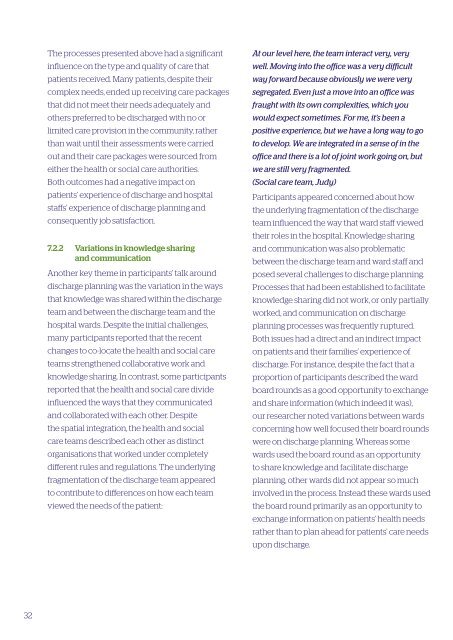Hospital Discharge
3Jzx309Yruj
3Jzx309Yruj
Create successful ePaper yourself
Turn your PDF publications into a flip-book with our unique Google optimized e-Paper software.
The processes presented above had a significant<br />
influence on the type and quality of care that<br />
patients received. Many patients, despite their<br />
complex needs, ended up receiving care packages<br />
that did not meet their needs adequately and<br />
others preferred to be discharged with no or<br />
limited care provision in the community, rather<br />
than wait until their assessments were carried<br />
out and their care packages were sourced from<br />
either the health or social care authorities.<br />
Both outcomes had a negative impact on<br />
patients’ experience of discharge and hospital<br />
staffs’ experience of discharge planning and<br />
consequently job satisfaction.<br />
7.2.2 Variations in knowledge sharing<br />
and communication<br />
Another key theme in participants’ talk around<br />
discharge planning was the variation in the ways<br />
that knowledge was shared within the discharge<br />
team and between the discharge team and the<br />
hospital wards. Despite the initial challenges,<br />
many participants reported that the recent<br />
changes to co-locate the health and social care<br />
teams strengthened collaborative work and<br />
knowledge sharing. In contrast, some participants<br />
reported that the health and social care divide<br />
influenced the ways that they communicated<br />
and collaborated with each other. Despite<br />
the spatial integration, the health and social<br />
care teams described each other as distinct<br />
organisations that worked under completely<br />
different rules and regulations. The underlying<br />
fragmentation of the discharge team appeared<br />
to contribute to differences on how each team<br />
viewed the needs of the patient:<br />
At our level here, the team interact very, very<br />
well. Moving into the office was a very difficult<br />
way forward because obviously we were very<br />
segregated. Even just a move into an office was<br />
fraught with its own complexities, which you<br />
would expect sometimes. For me, it’s been a<br />
positive experience, but we have a long way to go<br />
to develop. We are integrated in a sense of in the<br />
office and there is a lot of joint work going on, but<br />
we are still very fragmented.<br />
(Social care team, Judy)<br />
Participants appeared concerned about how<br />
the underlying fragmentation of the discharge<br />
team influenced the way that ward staff viewed<br />
their roles in the hospital. Knowledge sharing<br />
and communication was also problematic<br />
between the discharge team and ward staff and<br />
posed several challenges to discharge planning.<br />
Processes that had been established to facilitate<br />
knowledge sharing did not work, or only partially<br />
worked, and communication on discharge<br />
planning processes was frequently ruptured.<br />
Both issues had a direct and an indirect impact<br />
on patients and their families’ experience of<br />
discharge. For instance, despite the fact that a<br />
proportion of participants described the ward<br />
board rounds as a good opportunity to exchange<br />
and share information (which indeed it was),<br />
our researcher noted variations between wards<br />
concerning how well focused their board rounds<br />
were on discharge planning. Whereas some<br />
wards used the board round as an opportunity<br />
to share knowledge and facilitate discharge<br />
planning, other wards did not appear so much<br />
involved in the process. Instead these wards used<br />
the board round primarily as an opportunity to<br />
exchange information on patients’ health needs<br />
rather than to plan ahead for patients’ care needs<br />
upon discharge.<br />
32


